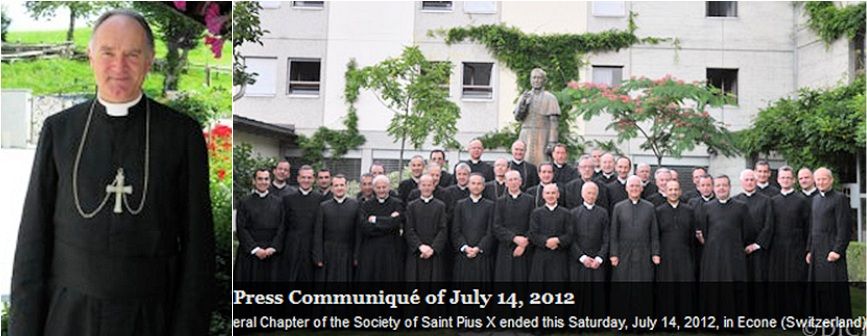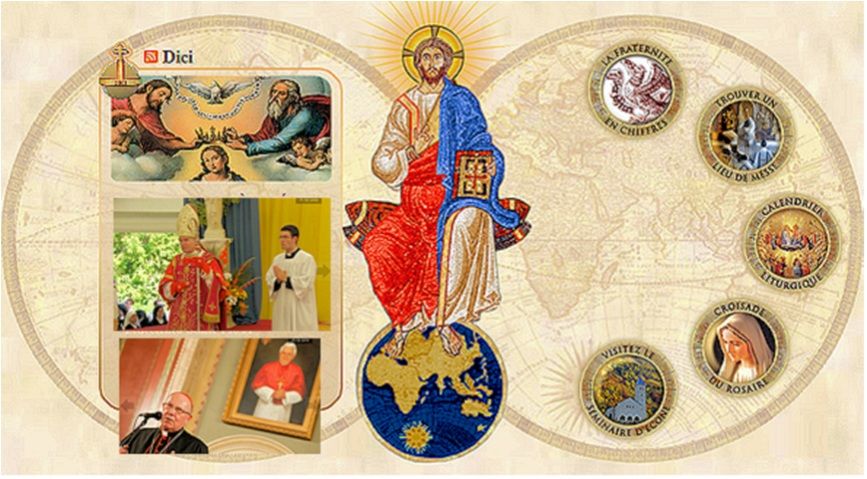 The FSSPX information arm, DICI, has now released the text of an interview with Mons. Fellay following the society's Chapter General meeting, and though he does not anticipate the content of the FSSPX letter to Rome expected this week, he does not sound as if he is closing off all avenues... I checked, and Tornielli has an article about the interview, in which he concludes that "the answer he [Fellay] is about to send to Rome is not to be understood as the definitive closure of the dialog, and more than one passage in the interview underscores acknowledgment of the Pope's authority, as well as the [FSSPX] desire not to set up a parallel Church".... Of course, this raises the obvious question: "If you acknowledge the Pope's authority, why not take his word that the aspects you object to in Vatican II are not incompatible with Tradition? After all, Mons. Lefebvre did sign all the Vaitcan II documents and no one held a gun to his head when he did so!
Interview with Mons. Fellay
The FSSPX information arm, DICI, has now released the text of an interview with Mons. Fellay following the society's Chapter General meeting, and though he does not anticipate the content of the FSSPX letter to Rome expected this week, he does not sound as if he is closing off all avenues... I checked, and Tornielli has an article about the interview, in which he concludes that "the answer he [Fellay] is about to send to Rome is not to be understood as the definitive closure of the dialog, and more than one passage in the interview underscores acknowledgment of the Pope's authority, as well as the [FSSPX] desire not to set up a parallel Church".... Of course, this raises the obvious question: "If you acknowledge the Pope's authority, why not take his word that the aspects you object to in Vatican II are not incompatible with Tradition? After all, Mons. Lefebvre did sign all the Vaitcan II documents and no one held a gun to his head when he did so!
Interview with Mons. Fellay

July 16, 2012
 How did the General Chapter go? How was the mood of the meeting?
How did the General Chapter go? How was the mood of the meeting?
It took place in a rather hot atmosphere, since July is a particularly hot month in the Valais! But in a very busy schedule, where the members of the Chapter were able to freely exchange ideas, as it befits such a working meeting.
Were you able to discuss the relations with Rome? Were there any forbidden questions? The dissensions manifested within the SSPX these last momths - have they calmed down?
That makes for quite a few questions! Regarding Rome, we went to the very heart of the issues, and all the capitularies were able to study the complete file. Nothing was left aside and there were no taboos among us.
It was my duty to exhibit with detail all the documentation exchanged with the Vatican, something which was rendered difficult by the obnoxious climate of recent months. This made it possible for us to conduct direct discussions which have cleared out the doubts and dissipated any misunderstandings, resulting in peace and unity of hearts, which of course is something to rejoice about.
How do you foresee the relations with Rome after this Chapter?
All ambiguity has now been resolved among us. Very soon we will convey to Rome the position of the Chapter, which has been the occasion to specify our road map insisting upon the conservation of our identity, the only efficacious means to help the Church to restore Christendom.
As I told you recently, “if we want to make fruitful the treasure of Tradition for the benefit of souls, we must both speak and act” (cf. interview of 8 June 2012, DICI #256). We cannot keep silent when facing the rampant loss of faith, the staggering fall of the number of vocations, and the decrease of religious practice. We cannot refrain from speaking when confronted with the “silent apostasy” and its causes. Doctrinal mutism is not the answer to this “silent apostasy” which even John Paul II denounced in 2003.
Our approach is inspired not only by the doctrinal firmness of Archbishop Lefebvre but also by his pastoral charity. The Church has always considered that the best testimony to the truth is to be found in the early Christians’ unity built in prayer and charity. They had “but one heart and one soul,” as we read in the Acts of the Apostles (cf. Acts 4, 32).
Such a common ideal is also our watchword, Cor Unum being the name of the internal bulletin of the SSPX. Hence we distance ourselves resolutely from all those who have tried to take advantage of the situation in order to drive a wedge turning Society members against each other. Such a spirit does not come from God.
What are your thoughts on the appointment of Archbishop Mueller as Prefect of the Congregation for the Doctrine of the Faith?
It is no secret that the former bishop of Regensburg, where our seminary of Zaitzkofen is located, does not like us. After the courageous action of Benedict XVI on our behalf, in 2009, he refused to cooperate and treated us as if we were lepers! He is the one who stated that our seminary should be closed and that our students should go to the seminaries of their dioceses of origin, adding bluntly that “the four bishops of the SSPX should resign”! (cf. interview with Zeit Online, 8 May 2009).
[Fellay is right, Mueller's words and actions in the recent past about the FSSPX were certainly eyebrow-raising, to say the least, but I am confident that at the CDF, he will do as the Pope says in this matter, not as he may personally feel.]
For us what is more important and more alarming is his leading role at the head of the Congregation for the Faith, which must defend the Faith with the proper mission of fighting doctrinal errors and heresy. Numerous writings of Bishop Mueller on the real transubstantiation of bread and wine into the Body and Blood of Christ, on the dogma of Our Lady’s virginity, on the need of conversion of non-Catholics to the Catholic Church… are questionable, to say the least! There is no doubt that these texts would have been in the past the object of an intervention of the Holy Office, now the very Congregation for the Doctrine of the Faith presided by him.
[On this matter, I will trust the theological opinion of Fr. Nicola Bux, who has apparently read the said statements in the context in which they were made and has found them unexceptionable, and more importantly, the judgment of Benedict XVI, who would never appoint anyone who had 'questionable' views about the three subjects raised!]
How do you see the future of the FSSPX? In the midst of its fight for the Church’s Tradition, will the FSSPX keep to the same knife’s edge?
More than ever we must maintain the knife’s edge traced by our venerated founder. It is not easy to keep, yet absolutely vital for the Church and the treasure of its Tradition.
We are Catholic, we recognise the Pope and the bishops, but above all else we must keep intact the Faith, source of God’s grace. Therefore we must avoid all that may endanger the Faith, without trying to become a replacement for the Church, Catholic, Apostolic, and Roman. Far from us the idea of establishing a parallel Church, of exercising a parallel magisterium!
This was well explained by Archbishop Lefebvre more than thirty years ago: he did not wish to hand down anything else but what he himself had received from the Church of two millennia. This is what we want also, following his lead, so that we may effectively help “to restore all things in Christ.”
It is not us who will break with Rome, the Eternal Rome, mistress of wisdom and truth.
Nevertheless, it would be unrealistic to deny that there is a modernist and liberal influence in the Church since the Second Vatican Council and its subsequent reforms.
In a word, we maintain the faith in the primacy of the Roman Pontiff and in the Church founded upon Peter, but we refuse all that contributes to the “self-demolition of the Church” acknowledged by Paul VI himself since 1968. May Our Lady, Mother of the Church, hasten the day of its authentic restoration!
 FSSPX homepage as of today. Events featured on the DICI photo line-up at left include the society's 2012 Rosary Crusade; Mons. Fellay's most recent homily at Econe; and Cardinal Levada addressing the FSSPX representatives and Ecclesia Dei members at the July 15 meeting.
FSSPX homepage as of today. Events featured on the DICI photo line-up at left include the society's 2012 Rosary Crusade; Mons. Fellay's most recent homily at Econe; and Cardinal Levada addressing the FSSPX representatives and Ecclesia Dei members at the July 15 meeting.
[Modificato da TERESA BENEDETTA 17/07/2012 02:41]